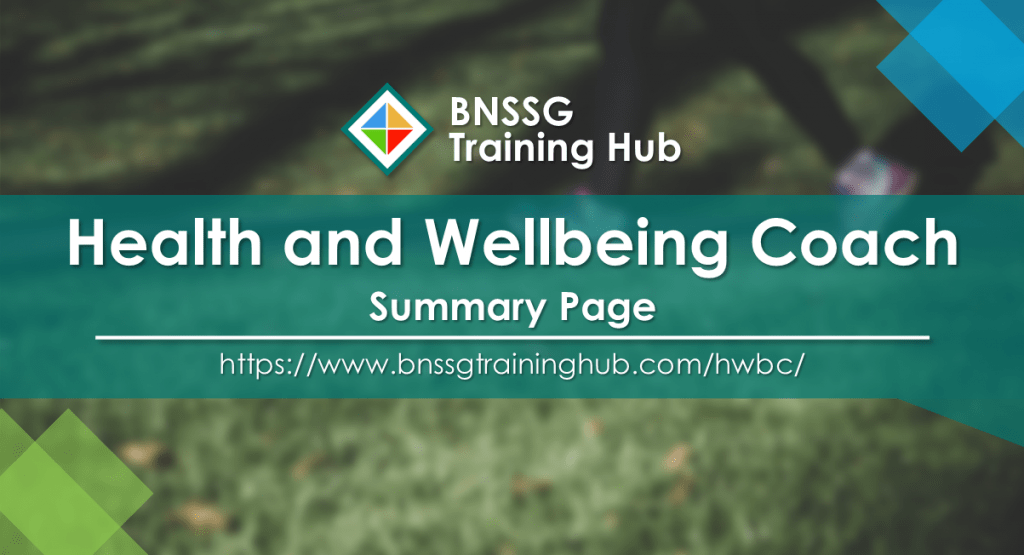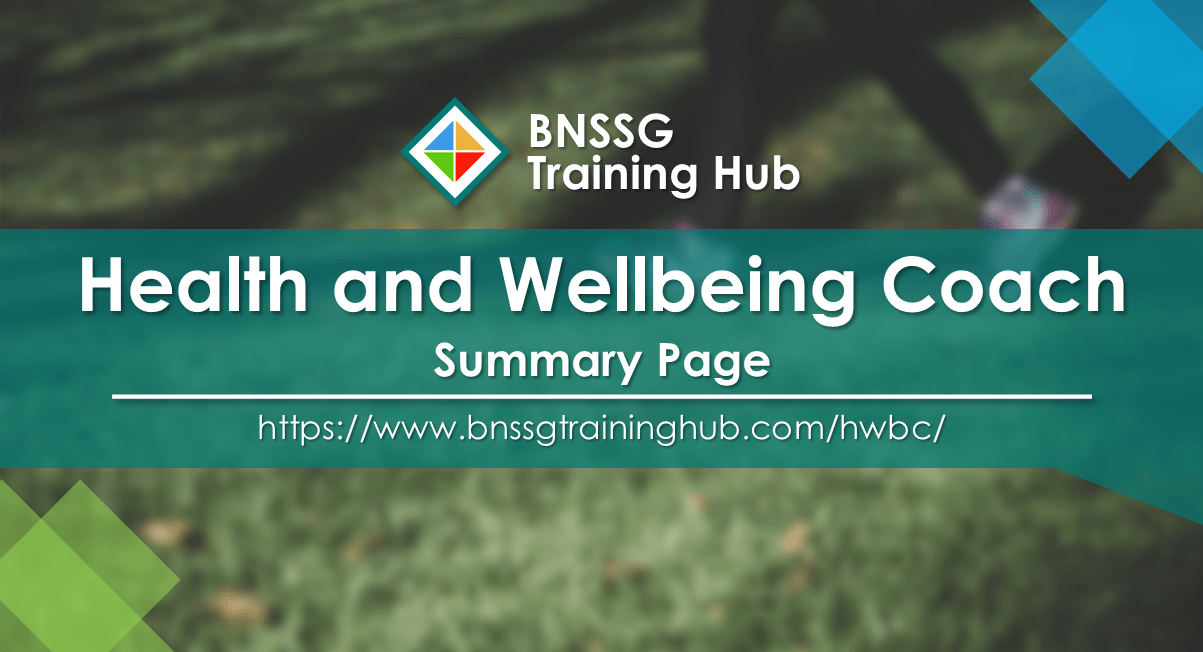What are they?
What benefits can they bring?
What is the scope of their practice?
Is funding available for them?
Any case studies?
What characteristics, training / qualifications, and competencies should they have?
Are there any requirements to receive ARRS funding?
Any example job descriptions?
Any sample interview questions?
What clinical supervision do they need?
What should practice induction include?
What ongoing support is available for HWBCs?
What is a Health & Wellbeing Coach (HWBC)?
As part of the PCN multidisciplinary team (MDT), health and wellbeing coaches (HWBCs) use their coaching skills to support patients and service users with lower levels of patient activation in becoming active in reaching their self-identified health and wellbeing goals.
As part of their work, HWBCs will:
- Work alongside health, social care, community, and voluntary sector providers and MDTs
- Provide education and specialist expertise to health staff, thereby improving their skills and understanding of personalised care and behavioural approaches
- Raise awareness within a primary care network (PCN) of tools that enable shared decision making (SDM)
HWBCs carry out their role using a non-judgemental approach, supporting patients to self-identify existing issues and encouraging proactive prevention of new illnesses. This approach requires strong communication and negotiation skills, in order to promote personal choice and positive risk-taking, while addressing potential consequences and ensuring patients take accountability for their decisions, chosen based on what matters to them.
For more information:
NHSE / I's Page on HWBCs
Provided by NHS England & NHS Improvement (NHSE / I), this short page serves as an introduction to the role of health and wellbeing coaches (HWBCs).
To read it, please click here.
What benefits can they bring?
Health and wellbeing coaches (HWBCs) can bring the following benefits to patients and PCNs.
For patients:
- Increased levels of patient activation and of preventative behaviours / self-management
- Overall improvement in health outcomes
- Additional time to address patient goals on an individual level, providing more support for them to pursue their own health goals
- Shown to improve two-way communication and partnership working
For PCNs:
- Increased patient activation can enable fewer visits to general practice, reducing demand for practice services
- Reported increase in job satisfaction amongst healthcare staff
- Less waste on account of unnecessary tests and medication
- Long-term, sustained benefits relating to cost reduction and service development
For more information:
NHSE / I HWBCs in Yeovil Case Study
Provided by Health Education England (HEE), this page offers a succinct look at the education and training requirements, skills and competencies, and work activities of health and wellbeing coaches (HWBCs).
To read it, please click here.
What clinical supervision do they need?
According to NHS England & NHS Improvement (NHSE /I), primary care networks (PCNs) should ensure that health and wellbeing coaches (HWBCs) have regular access to clinical / non-managerial supervision with both a GP and other relevant health professionals. This is to assist with the emotional impact of their work and guide them on how to effectively deal with patient risk factors.
NHSE / I have also stated that all primary care networks (PCNs) should ensure their HWBCs have access to four-day health coaching training, including access to a health coaching supervisor who can directly supervise the HWBCs.
It should be noted that health coaching supervision is different from clinical and caseload supervision and one-to-one line management.
For more information:
NHSE / I Welcome Pack for HWBCs
Provided by NHS England & NHS Improvement (NHSE / I), this document serves as a welcome pack for health and wellbeing coaches (HWBCs) starting employment in a primary care network.
To read it, please click here.
What should practice induction include?
NHS England & NHS Improvement (NHSE / I) have compiled an induction guide for health and wellbeing coaches (HWBCs) joining a primary care network. This twenty one-page document includes links to an assortment of resources and covers the following topics:
- What is personalised care?
- What can HWBCs do?
- What support should be available for HWBCs?
- And more…
For more information:
NHSE / I Welcome Pack for HWBCs
Provided by NHS England & NHS Improvement (NHSE / I), this document serves as a welcome pack for health and wellbeing coaches (HWBCs) starting employment in a primary care network.
To read it, please click here.
What ongoing support is available for HWBCs?
NHS England & Improvement (NHSE / I) have, in their health and wellbeing coach (HWBC) welcome pack, compiled a list of available support structures and mechanisms — including an online learning community, accessible by contacting:
NHSE / I Services
Included in their induction guide for social prescribing link workers (SPLWs), NHS England & NHS Improvement (NHSE / I) have compiled a list of ongoing support and resources, including:
- Online health and wellbeing coach learning
- National ‘share and learn’ lessons
- Learning, developmental, and peer support
- Online collaboration
To read it, please click here.
Personalised Care Institute
The Personalised Care Institute has a range of FREE training, resources, and podcasts available for health and wellbeing coaches (HWBC).
To find out more, please click here.
What is the scope of their practice?
According to Health Education England (HEE), a health and wellbeing coach (HWBC) is required to provide one-to-one coaching support for people with one or more long-term conditions, adhering to what is important to them, with the aim of:
- Improving people’s knowledge, confidence and skills-levels of ‘patient activation’
- Empowering people to improve their health outcomes and sense of wellbeing
- Preventing unnecessary reliance on clinical service
- Providing interventions such as self-management education and peer support
- Supporting people to establish and attain self-identified goals
- Working with the social prescribing service to support the triaging of referrals that connect people to the right intervention / community-based activities which support their health and wellbeing
- To work as part of a multidisciplinary, multi-agency team to promote health coaching, and to be ambassadors for personalised care and supported self management, modelling the coaching approach in their work
This is not an exhaustive list, however.
For more information, please read:
HEE's Health and Wellbeing Coach Role Overview
Provided by Health Education England (HEE), this page offers a succinct look at the education and training requirements, skills and competencies, and work activities of health and wellbeing coaches (HWBCs).
To read it, please click here.
Is funding available for them?
As health and wellbeing coaches (HWBCs) are included on the additional roles reimbursement scheme (ARRS), funding is available for them; from April 2020, this role can be reimbursed at 100% of actual salary plus defined on-costs, up to the maximum reimbursable amount of £35,389 over 12 months.
For more information:
HEE's Health and Wellbeing Coach Role Overview
Provided by Health Education England (HEE), this page offers a succinct look at the education and training requirements, skills and competencies, and work activities of health and wellbeing coaches (HWBCs).
To read it, please click here.
What characteristics, training / qualifications, and competencies should they have?
Health Education England (HEE) advocates that health and wellbeing coaches (HWBCs) should have the following skills and competencies:
- Able to work within a biopsychosocial model, using a range of tools and techniques to enable and support people, such as agenda setting, goal setting, problem solving
- Active and empathic listening
- Appropriate use of problem-solving and goal follow-up across sessions to maintain and increase activation
- Being responsive and sensitive to the needs and beliefs of the client
- Building trust and rapport
- Collaborative goal setting
- Creating and maintaining a safe and positive relationship
- Developed skills to further develop their health coaching through ongoing practice, reflection, and planning as reflective practitioners
- Effective questioning
- Knowledge and recognition of the core concepts and principles of personalised care, shared decision making, patient activation, health behaviour change, self-efficacy, motivation, and assets-based approaches
- Managing and making effective use of time
- Managing resistance to change and ambivalence
- Providing supportive challenge
- Setting and maintaining appropriate boundaries
- Shared agenda setting
- Shared follow-up planning
- Structuring conversations using a coaching approach
- Structuring programme and sessional goals
- Understanding and applying the health coaching approach and mindset
- Using simple health literate communication techniques
For more information:
HEE's Health and Wellbeing Coach Role Overview
Provided by Health Education England (HEE), this page offers a succinct look at the education and training requirements, skills and competencies, and work activities of health and wellbeing coaches (HWBCs).
To read it, please click here.
Are there any requirements to receive ARRS funding?
As noted under ‘Is funding available for them?‘, health and wellbeing coaches (HWBCs) can be reimbursed via the Additional Roles Reimbursement Scheme (ARRS). However, to be eligible for this funding, there are requirements that must be adhered to.
For instance, as stated in Annex B of the Network Contract Directed Enhanced Service contract specification 2021 / 22:
- “B4.1. Where a PCN employs or engages a Health and Wellbeing Coach under the Additional Roles Reimbursement Scheme, the PCN must ensure that the Health and Wellbeing Coach:
- is enrolled in, undertaking or qualified from appropriate health coaching training covering topics outlined in the NHS England and NHS Improvement Implementation and Quality Summary Guide, with the training delivered by a training organisation listed by the Personalised Care Institute;
- adheres to a code of ethics and conduct in line with the NHS England and NHS Improvement Health coaching Implementation and Quality Summary Guide;
- has formal individual and group coaching supervision which must come from a suitably qualified or experienced individual; and
- working closely in partnership with the Social Prescribing Link Worker(s) or social prescribing service provider to identify and work alongside people who may need additional support, but are not yet ready to benefit fully from social prescribing
For more information:
Network Contract DES contract specification 2021 / 22
Provided by NHSE / I, this document outlines the Network Contract Directed Enhanced Service (DES) for 2021 / 22.
To read it, please click here.
Any example job descriptions?
According to Health Education England (HEE), sample job descriptions and recruitment packs have been developed by NHS England & Improvement (NHSE / I).
An example job description from NHSE / I is linked below.
For more information:
NHSE / I's Sample JD and Interview Questions
Provided by NHS England & Improvement (NHSE / I), this document offers a sample job description and interview questions.
To read it, please click here.
Any example sample interview questions?
NHS England & Improvement (NHSE / I) have produced a recruitment pack featuring sample interview questions.
For more information:
NHSE / I's Sample JD and Interview Questions
Provided by NHS England & Improvement (NHSE / I), this document offers a sample job description and interview questions.
To read it, please click here.
What are the benefits of employing a Health & Wellbeing Coach?
Health and wellbeing coaches (HWBCs) can support patients in making positive choices for their health and wellbeing; consequently, they can lead healthier lives and will be less likely to require the services of health and care centres, reducing the burden of ill-health in the patient population.
Any sample case studies?
NHS England & NHS Improvement (NHSE / I) have provided the following case study on the effects of health and wellbeing coaches (HWBCs) on patients with long-term conditions in Yeovil.
A South Somerset GP interviewed as part of the case study had the following to say:
“What’s different is probably the perception of what is possible and permissible. We feel in control rather than being an island under attack retreating from the relentless onslaught of demand on one side and reduction in provision on the other.”
For more information:
NHSE / I HWBCs in Yeovil Case Study
Provided by Health Education England (HEE), this page offers a succinct look at the education and training requirements, skills and competencies, and work activities of health and wellbeing coaches (HWBCs).
To read it, please click here.
Literature
HEE's Health and Wellbeing Coach Role Overview
Provided by Health Education England (HEE), this page offers a succinct look at the education and training requirements, skills and competencies, and work activities of health and wellbeing coaches (HWBCs).
To read it, please click here.
Network Contract DES contract specification 2021 / 22
Provided by NHSE / I, this document outlines the Network Contract Directed Enhanced Service (DES) for 2021 / 22.
To read it, please click here.
NHSE / I HWBCs in Yeovil Case Study
Provided by Health Education England (HEE), this page offers a succinct look at the education and training requirements, skills and competencies, and work activities of health and wellbeing coaches (HWBCs).
To read it, please click here.
NHSE / I's Page on HWBCs
Provided by NHS England & NHS Improvement (NHSE / I), this short page serves as an introduction to the role of health and wellbeing coaches (HWBCs).
To read it, please click here.
NHSE / I's Sample JD and Interview Questions
Provided by NHS England & Improvement (NHSE / I), this document offers a sample job description and interview questions.
To read it, please click here.
A / V resources
Health and Wellbeing Coaches - A Typical Day
A short video provided by Cumbria City Council, which offers an insight into the day-to-day work of health and wellbeing coaches (HWBCs).
To watch it, please click here.
[This video was uploaded on 11.07.18.]




